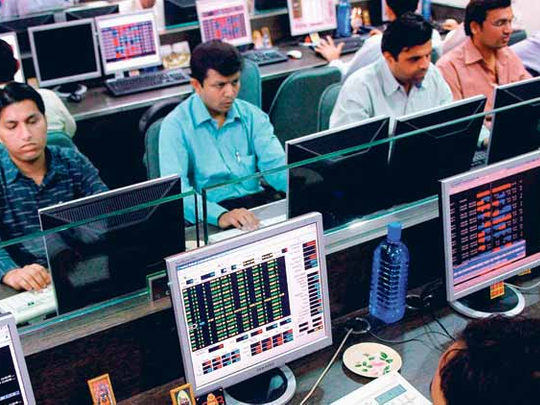
Mumbai: Uncertainties over India's annual budget, which is scheduled to be released next Friday, will overshadow the stock market this week. Policymakers have given subtle hints the government will kick off efforts to withdraw fiscal incentives such as duty cuts and tax breaks that were put in place to help weather the global downturn that started in 2008.
India's $1.3-trillion (Dh4.7-trillion) economy is set to expand more than 7.2 per cent in the current year ending March and pick up the pace to over 8 per cent in 2010/11, C. Rangarajan, the chairman of the prime minister's Economic Advisory Council said on Friday.
The influential official, who is also a former governor of the Reserve Bank of India, was speaking after the panel released a report detailing the need to balance growth and fiscal consolidation, a week ahead of finance minister Pranab Mukherjee's budget.
The government cannot continue with the kind of large revenue and fiscal deficits recorded in the last two years and will have to initiate "fiscal consolidation in the coming fiscal year itself", the panel said.
New Delhi's fiscal deficit is estimated to have reached 6.8 per cent of gross domestic product, the highest in 16 years and threatens to blow up government borrowing, crowd private-sector access to funds, push up interest rates and scare away overseas investors.
Fiscal deficit
"While it is important to reduce the fiscal deficit significantly in the coming budget, it is important to safeguard capital expenditures, particularly in the infrastructure sectors," the report said.
HDFC Bank, India's second-largest private bank, said the government would target to raise Rs200 billion (Dh15.8 billion) through stake sales in state companies, increase excise duty by 2 per centage points to 10 per cent and bring more services under the tax net. It said state-controlled fuel prices could be raised by March, reducing the subsidy bill for the government.
"The least we can expect from the forthcoming budget is a roadmap for implementation of these reforms so that a clearer picture of medium-term fiscal consolidation emerges," the bank said.
Automobiles, cement, construction and machinery makers are some of the sectors that could be hit by an upward revision in excise duty, but the robust growth already underway should help cushion the blow, traders said. Industrial output in December had hit a record 16.8 per cent, and lawmakers and central bank officials have said the rollback of stimulus packages would be gradual and calibrated.
Besides with the government banking on divestment as a source of revenue, it can ill afford to trigger a stock market slide and risk jeopardising its grand plans.
Morgan Stanley analysts Ridham Desai and Sheela Rathi believe investors should grab opportunities to build a portfolio if prices drop.
"The good news is that the market is already aware of most of the risks but needs time to settle the debate," the analysts said in a report. "The near term is likely to continue to be volatile, but we think investors should be buying the dip rather than selling the rally."
Inflation pressures
They said earnings for companies on the top-30 Sensex may rise at a compound annual rate of 18 per cent to the year ending 2011-12 and offers upside risks.
"We believe that the current environment resembles 2004, with a rise in short rates likely to pre-empt inflation pressures in an accelerating growth environment," they wrote. "The key risk is that the central bank falls behind the curve and rising inflation ultimately hurts growth and stock prices in 2011."
The Sensex has edged higher for two weeks in a row but is down about seven per cent this year, after soaring 81 per cent in 2009 in its biggest yearly rise in almost two decades.
Key events this week are: the railway budget on Wednesday; a report card on the economy the following day and the national budget on Friday.
Geetha Bhaskaran is a journalist based in Mumbai.












